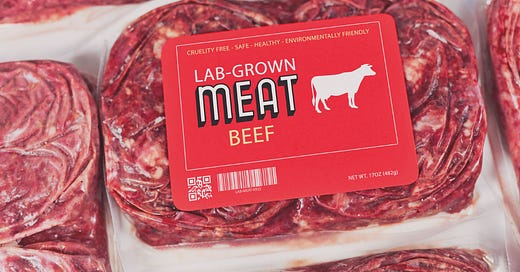SUMMARY: Marketing can be “tricky” business, especially when the intention is self-interest, and based solely on profits as the bottom line. We were duped in the 1950s with the false notion that consuming fats was a bad idea for heart health. This led us into refined-carbohydrate overload, and contributed to monstrous numbers of type 2 diabetes, obesity, and heart disease. Though we’ve made strides in uncovering the truth, today we’re faced with a next-level conundrum—being told by manufacturers, and sold by advertisers, that consuming highly-processed food-like products, such as lab-grown meat is a smart idea.
“Tell me what you eat and I will tell you what you are.”
The above quote is an assertion many nutritionists and health care providers have suggested for centuries, but with so many differing opinions, how do you know which diet is right for you? Along the wide spectrum, from raw vegan to carnivore, there’s “science” to support the health benefits at each end, and everything in between.
Navigating the ever-changing marketing campaigns can feel overwhelming and chaotic, and drive the healthiest eater into a habitual compulsive eating frenzy.
The Promised Land?
As the public became more aware of the environmental damage, health dangers and animal cruelty, that’s a distinct reflection of the factory farming industry, logically, society was hungry for better options.
However, when health conscious individuals began steering clear of meat and opting for veggie burgers, tofu turkeys, and coconut bacon, they quickly realized something was missing. No matter the recipe, the fatty, succulent and juicy nature of real meat couldn’t be replicated.
Peeling the Onion…
When the new plant-based “meat” companies launched, things seemed promising. They boldly asserted their products used “95% less land and 74% less water, and created 87% less in greenhouse gas emissions, than a beef burger of equal size.” Even better, with claims such as, “100% mouthwatering,” and “Better for you. Better for the planet,” many consumers were eager to take a bite.
In February 2015, the first Beyond Burger from parent company Beyond Meat hit the shelves, with the Impossible Burger from Impossible Foods debuting shortly after in July 2016.
Both companies boasted that their burgers tasted, browned, and even “bleeded” like real meat, but while the former was sourced from beets, the latter was created from a plant-derived compound, leghemoglobin (a soy derivative), similar structurally to the hemoglobin in our blood.
This was the first time this compound had been isolated to use in food.
However delicious this food-like product may have been, the criticism was quick to arrive. AGDAILY warned:
“Leghemoglobin in a burger is contentious for a couple of reasons. Leghemoglobin has never been consumed by humans before, and Impossible Foods did very little safety testing before including it in their burger. The FDA advised Impossible Foods that they have not proven the safety of leghemoglobin, but the FDA has not prohibited the company from marketing their burger. Impossible Foods insist leghemoglobin is identical to the “heme” humans have consumed for millennia, but it is not.
The heme portion of the molecule is an iron atom attached to four nitrogen atoms, each of which is attached to four carbon atoms, forming what is called a porphyrin ring. This iron-binding porphyrin is the foundation of a plethora of compounds called hemoproteins. The side chains attached to the heme structure determine the protein function, and blood hemoglobin is not the same protein as leghemoglobin.”
This skepticism wasn’t unfounded. In January 2021, the Center for Food Safety (CFS) filed a brief with the Ninth Circuit Court of Appeals disputing the U.S. Food & Drug Administration's (FDA) approval of soy leghemoglobin stating:
“FDA approved soy leghemoglobin even though it conducted none of the long-term animal studies that are needed to determine whether or not it harms human health. This includes studies for cancer, reproductive impairment and other adverse effects called for by FDA’s Redbook, the Bible of food and color additive testing.
We find this to be all the more troubling because a number of potential adverse effects were detected in a short-term rat trial: disruption of reproductive cycles and reduced uterine weights in females and biomarkers of anemia, reduced clotting ability and kidney problems.”
That wasn’t the only bad news for the newly emerging fake meat industry. As many people were looking for healthy alternatives to factory farmed meat (being fed a genetically-modified corn diet), the news that Impossible Burgers contained not only GMO soy (leghemoglobin), but genetically-modified yeast and 11ppb of the herbicide glyphosate (0.1ppb of glyphosate has been linked to altered gene function and organ damage in rats), was disastrous.
Know thy ingredients: Beyond Burger doesn’t fare well here either. Touting the Non-GMO project label, you’d assume it was a safe and healthy food.
With ingredients like Red No. 3 (thyroid carcinogen), caramel coloring (carcinogen), TBHQ (risk of tumors, liver problems, convulsions and neurotoxic effects), STTP (neurotoxic and can cause digestive distress), propylene glycol and soy protein isolates/concentrates/textured vegetable proteins that are chemically separated by hexane (neurotoxin and may cause damage to reproductive and fetal health), the joke’s on you, the consumer, and it’s not funny.
Chain restaurants like Denny’s, Del Taco, Carl’s Jr. and Peet’s Coffee began serving Beyond Meat products, and Burger King, Qdoba, Cheesecake Factory, and Red Robin started serving Impossible Foods (with more restaurants constantly being added).
Major grocery stores wasted no time getting on board, influenced by the hype as well. With the net worth of Beyond Meat at just under 1 billion dollars, and Impossible Foods at 4 billion, the stakes were undoubtedly high for investors, so the push for the products to reach the shopper became job number 1.
One contributor who’s invested into both companies (in addition to other lesser-known brands) is self-proclaimed environmentalist, Bill Gates. With a lot riding financially (and possibly even more as far as environmental policy), he stated:
“I do think all rich countries should move to 100 percent synthetic beef. You can get used to the taste difference, and the claim is they’re going to make it taste even better over time. Eventually, that green premium is modest enough that you can sort of change the [behavior of] people or use regulation to totally shift the demand.
So for meat in the middle income and above countries, I do think it is possible. But it is one of those ones where, wow, you have to track every year and see, and the politics [are challenging]. There are all these bills that say it’s got to be called, basically lab garbage to be sold. They don’t want us to use the beef label.”
Danger Ahead: Questions Unanswered
If this news wasn’t frightening enough, the most concerning ventures in the fake meat industry seem to be on the horizon: cultivated meat. Israeli company, Redefine Meat, has taken mystery meat to another level. 3D printed “steaks” and other cuts that were previously impossible to recreate are making it on the plates of fine dining restaurants in the UK, Germany, Netherlands, and Israel.
The company has yet to disclose its trade secrets, yet they’re said to include “a range of proprietary and patented technologies, including Meat Matrix Additive Manufacturing.” A study in Nature Communications goes over the science of how this kind of technology is achieved, but falls short in giving consumers the safety data they need.
Food tech company, GOOD Meat is also venturing into the cultivated meat industry. The company website states:
“We begin by sourcing the best cells from the best chickens and cows. We painlessly extract cells from an egg or living animal. We examine the cells and choose the ones most likely to produce the healthiest, most delicious and most sustainable meat. The cells are “immortalized,” meaning they can continue to divide and produce GOOD meat indefinitely.”
Ethics and morality aside, where are the long-term safety studies that were performed before these products hit the market? We just don’t have the answers yet. As frightening as that is, there are two other companies that should send a shiver down your spine.
American scientists along with a team of designers have conceptualized a company, Ouroboros Steak, which involves a “DIY” kit that uses your own cheek cell cultures which are fed with expired, blood bank donor blood (serum) to grow your own meat at home.
The company espouses its achievements by saying it created a product without causing harm to animals. This cannot be said about other companies using animal cell harvesting technology which relies on fetal bovine serum (FBS). However, serious questions remain.
Most importantly, is proper testing being done to ensure growing tissue from expired human blood is safe for human consumption? Are blood samples being tested for diseases or chemical contaminants? Are diseases that stem from cannibalism like Kuru (a prion disease) or something similar possible? We need more answers than we are being given.
If meeting the requirements of the FDA gives you a warm, fuzzy feeling inside, take note: As stated in a November 2022 announcement, the FDA is working with companies who are creating these lab-meat specimens from cells of living animals. While the FDA will do their best to ensure your “safety,” ultimately it’s up to the manufacturers to meet food safety requirements:
“The FDA is continuing to work with firms that are developing food made from cultured animal cells to ensure that the processes used to produce them are safe and lawful under the Federal Food, Drug, and Cosmetic Act. While it is a shared responsibility for the FDA and industry to ensure food is safe, it is the manufacturer’s responsibility to ensure they are marketing food that meets all applicable FDA requirements.”
Above All Else… Hollywood?
This brings us to BiteLabs.—”luxury” meat at its best.
They start with top-quality ingredients, and time-honored recipes for the creation of fine cured meats. They mix celebrity and animal meats, grown in house through a proprietary culturing process, into curated salami blends. Starting with biopsied myoblast cells, they grow healthy, rich, meats in BiteLabs’ own bioreactors.
Their process yields high-quality, luxury protein, in a sustainable manner that eliminates the environmental and ethical concerns associated with traditional livestock production.
Yes folks, still conceptual, but it’s indeed, cannibal salami. Their website asks readers to tag their favorite celebrity and use the hashtag, #EatCelebrityMeat.
Clearly not developed for its sustainability or health-purporting qualities, this novel, shocking “meat” brand is undeniably macabre and should make us all ponder this concept, “Even if we can, should we?”
With these horrifying concoctions looming, wouldn’t it be better if we could find a way to eat that even slightly resembled farm life? Looking to the future, regenerative farming and sustainable agriculture seem to be our only hope.
Instead of manufactured, chemical-laden, potentially unsafe “burgers” and “meat,” vegans and vegetarians can opt for organic, plant-based fare, and meat eaters can rest easy eating locally-sourced, pasture-raised meat.
There are many healthy options available that are environmentally friendly, kind to animals, and nutritionally-sound.
Joel Salatin, one of the godfathers of regenerative agriculture said:
“Don’t blame the cow for the negatives of the industrial food system. All of the data that the anti-meat people use assumes an irrigated, concentrated animal feeding operation. Over 50 percent of the annuals that we grow in American agriculture are to feed cows. Cows aren’t supposed to eat corn. They’re supposed to mow forage.
It’s completely inverted from nature’s paradigm. To use that inverted paradigm to demonize grazing, the most efficacious mechanism for planet restoration, is either consciously antagonistic to the truth or is ignorant of the kind of synergistic models that are out here. Here’s the thing. There’s no system in nature that does not have an animal component as a recycling agent. Doesn’t exist.”
The Choice is Yours
One way to be part of the change in restoring balance to our food system is to reach out and meet with local farmers and grass-fed beef ranchers in your area. These are the people who are working diligently to keep food as it was intended to be—humanely-raised, sustainably-farmed, and nutrient-dense.
Real food is what your body was designed to run on. Good nutrition comes from the way these foods are produced.
From “Factory Farmed Meat and the Decline of Nutrient Density,” AVFCA colleague, Carter Trent, said it best, “By making the decision to stay away from factory farmed meat, you’re upleveling the nutrients you’re consuming from your food source, while incentivizing the agricultural industry to shift to sustainable practices.”
It’s evident now more than ever that your state of health is your personal responsibility, and cannot be outsourced. Trusting the regulatory agencies when power and money trump fairness and safety is not a reliable way to infuse wellness and strengthen your longevity.
Being a proactive advocate for change starts with making lifestyle shifts, and includes voting with your dollars. Making the decision to forgo imposter burgers, and eat natural foods is a choice that can heal your body and the planet.
~
Originally published by A Voice For Choice Advocacy on November 17, 2022.
If you would like to support the research and health education of AVFC editorial, consider making a donation today.






I'm disgusted to see you promote grass fed cow flesh. So you think that animals are nothing more than unfeeling inanimate objects to do whatever we please with? ALL animals, not just your cats and dogs, feel pain, joy, fear and have friendships with both humans and animals. They have families that they care about.
We have been vegan and animal rights activists for 9 years starting when we were 56. We have stood in front of slaughterhouses at vigils for them and seen the absolute fear of the animals in the slaughter trucks. I have watched all kinds of videos of what is done to animals in the name of food that we do not need to eat. I do this so I can speak out for them.
I will NEVER take a shot. And I will NEVER treat animals the same way the pharmaceutical industry is treating us. They see us the same way that you see animals. The pharmaceutical industry thinks your lives are worth nothing and it's fine to force you into taking their poison. I will never turn around and do this to animals. What is done to them is horrific. Learning that the egg industry grinds up day old male baby chicks ALIVE, turned us from vegetarian to vegan that night. There is nothing but harm in slitting a gentle grass fed or factory farmed cow's throat.
If you don't want to eat plant based meat, then don't. But don't promote harm to animals. I'm glad that you advocate for our right of choice in vaccines but really disappointing that you promote cruelty to animals because that is what slitting their throats is. Where is their choice???